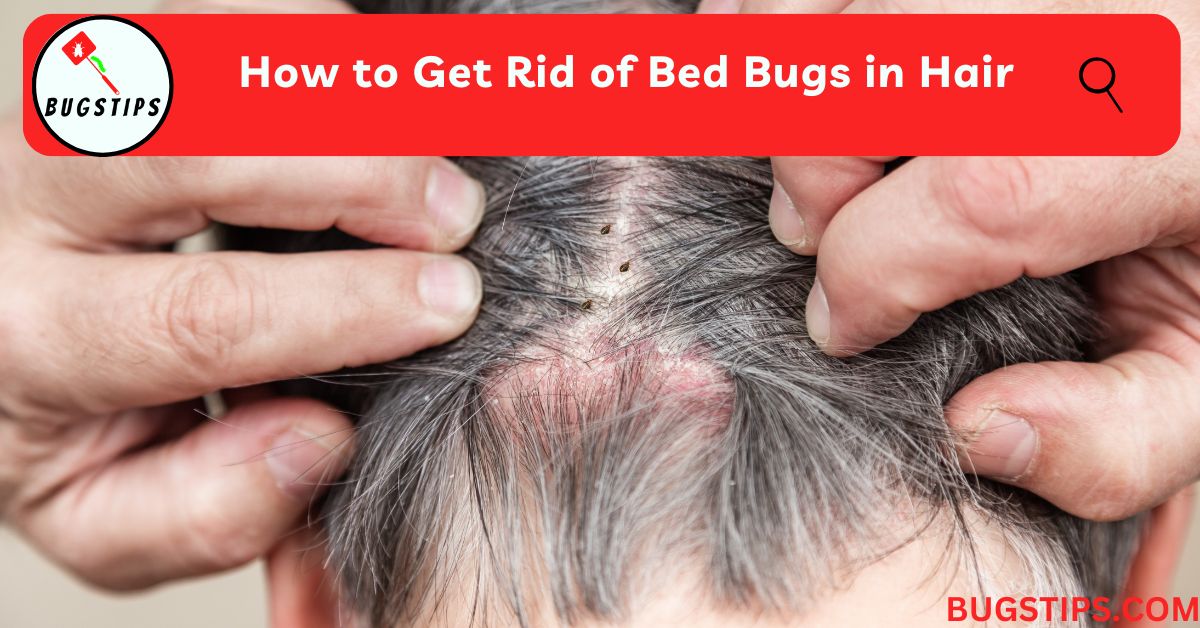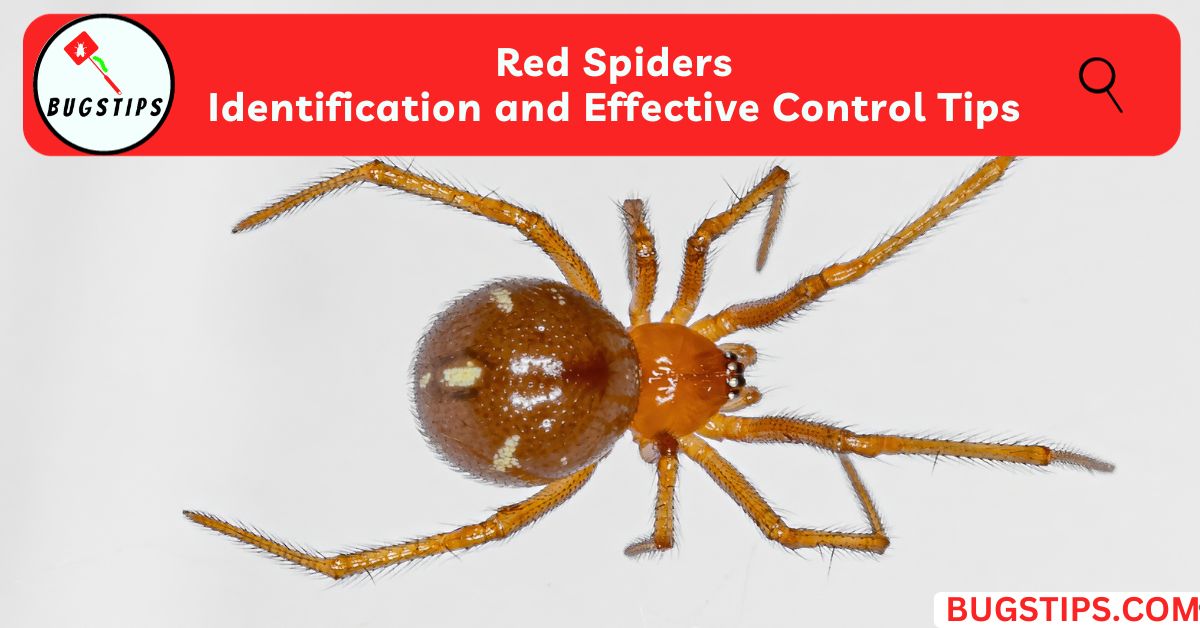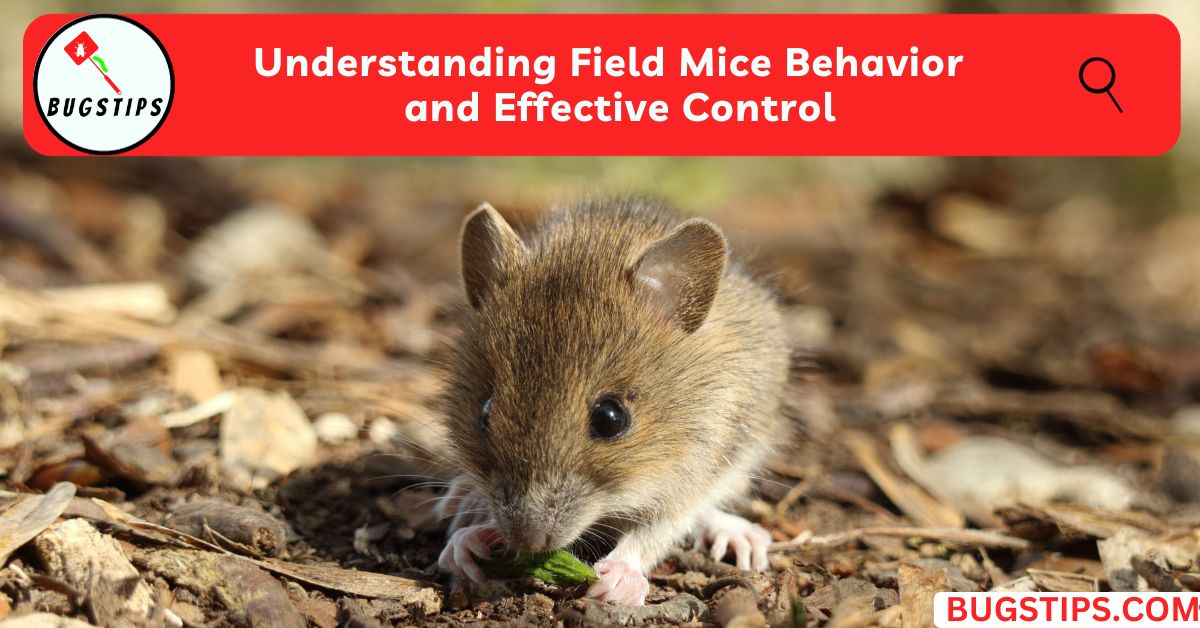This post may contain affiliate links which means as an Amazon Associate, this site may earn a small commission on qualified purchases made through links at no extra cost to you. Learn more on Affiliate Disclosure
If you’re dealing with a mice infestation in your home, you may have heard about using boric acid as a potential solution. But does boric acid actually kill mice, and is it a reliable method for controlling rodent populations?
In this article, we’ll explore the use of boric acid for mice control and provide information on its effectiveness, safety, and best practices. We’ll also discuss alternative methods for controlling mice infestations, as well as tips for creating a mice-free environment in your home.
So, if you’re curious about the potential of boric acid in tackling your mice infestation or other methods keep reading to discover the details.
What is Boric Acid?
Boric acid goes by several names, such as acidum boricum, hydrogen borate, boracic acid, and orthoboric acid. It is a weak monobasic Lewis acid of boron, In simpler terms, boric acid is a compound made up of boron, oxygen, and hydrogen.
You might be wondering where boric acid comes from. Well, it occurs naturally and can be found in certain minerals and volcanic areas. However, commercially, it is often produced by reacting borax with hydrochloric acid.
Boric acid can take the form of colorless crystals or a white powder that dissolves easily in water. It doesn’t have any strong odor, so you won’t be overwhelmed by unpleasant smells when using it.
One interesting thing about boric acid is its versatility. It possesses antiviral, antifungal, and antiseptic properties, which makes it useful in various applications. Apart from mice control, you can find boric acid in products like antiseptics, insecticides, flame retardants, neutron absorbers, and as a precursor to other boron compounds.
It’s worth noting that boric acid is a weak acid, meaning it doesn’t fully dissociate in water. Its pH value, a measure of acidity, is around 9.24, making it mildly acidic.
Related Article – Skunk Holes | The Comprehensive Guide
How Does Boric Acid Work in Pest Control
Boric acid is a common ingredient in many insecticides and is often used to control pests like cockroaches, ants, and bed bugs.
Here are a few ways in which boric acid works in pest control:
- Boric acid can kill insects if they eat it. When insects ingest boric acid, it can disrupt their stomach and affect their nervous system. It can also scratch and dehydrate their exoskeleton, which can ultimately lead to their death.
- Boric acid is most commonly used in pesticides and can be found in a variety of forms, including tablets, liquids, powders, and traps.
- Applying boric acid topically or by contact with the insect is not effective. Insects must eat the boric acid for it to be effective.
- Boric acid is a slow-acting poison, which means that it can take several days to kill an insect. This slow action can be an advantage in some cases, as it allows the insect to carry the poison back to its nest or colony, where it can infect other insects.
However, it's important to note that boric acid may not be effective against all types of insects, and its efficacy can vary depending on the species and circumstances. While it can be successful in combating certain pests, it may not always be the best solution for every situation.
What is the Difference Between Boric Acid and Borax?
Before we discuss how to use boric acid for mice control, it’s important to understand the difference between boric acid and borax. While both compounds contain boron, oxygen, and hydrogen, they have different chemical structures and properties.
Unfortunately, many people mistakenly use these terms interchangeably, which can lead to confusion and potentially unsafe practices. So here, we’ll explain the main differences between boric acid and borax.
Boric Acid
- Chemical formula: H3BO3.
- Also known as hydrogen borate, boracic acid, and orthoboric acid.
- Weak monobasic Lewis acid of boron.
- Weak acid with antiviral, antifungal, and antiseptic properties.
- Used as an antiseptic, insecticide, flame retardant, neutron absorber, or precursor to other boron compounds.
- Prepared by reacting borax with mineral acid or hydrochloric acid.
- Soluble in water and does not have any characteristic odor.
- Usually encountered as colorless crystals or a white powder that dissolves in water.
Borax
- Chemical formula: Na2B4O7·10H2O
- Also known as sodium borate, sodium tetraborate, or disodium tetraborate.
- Natural mineral and a salt of boric acid.
- Used as a cleaning agent, laundry booster, and insecticide.
- Prepared by reacting borax ore with sulfuric acid or hydrochloric acid.
- Soluble in water and has a slightly alkaline pH.
- Usually encountered as a white powder or colorless crystals.
So boric acid is a weak acid that is used as an antiseptic, insecticide, and flame retardant, while borax is a salt of boric acid that is used as a cleaning agent, laundry booster, and insecticide.
Does Boric Acid Kill Mice and Rats?
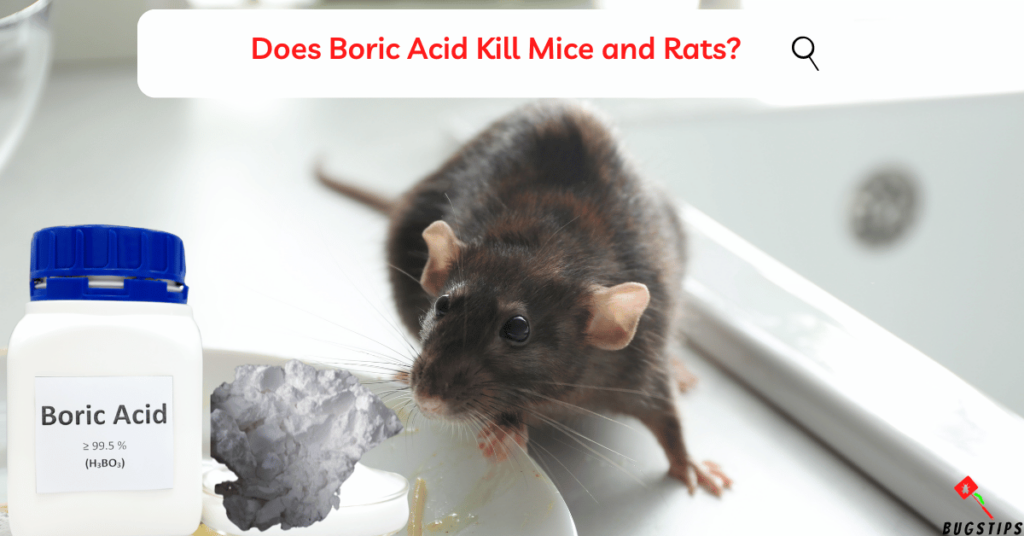
The question of whether boric acid can effectively kill mice and rats is a commonly debated topic. While boric acid can kill insects, such as cockroaches and ants, its effectiveness against rodents is a different story.
The truth is that boric acid alone is not a reliable solution for eliminating mice and rats. Even in large amounts, boric acid may do little to deter or kill these rodents. It is important to set realistic expectations when considering boric acid as a mice control method.
That being said, we understand that personal experiences can vary. Some homeowners have reported positive results when using boric acid to combat mice infestations.
While we can’t guarantee that you will achieve the same results, it is worth noting that individual outcomes may depend on various factors such as the severity of the infestation, the behavior of the rodents, and the specific circumstances of your home.
You May Also Like – 16 Powerful Scents That Repel Chipmunks
It’s important to listen to the experiences of other homeowners as well. While some may have shared positive outcomes with boric acid, many others have reported that it did not work effectively for mice and other rodents.
This highlights the importance of considering a range of experiences and opinions when deciding on the best approach for your specific situation.
However, we want to provide full transparency based on our personal experiences. While boric acid may not be universally effective against mice and rats, we have personally tried this method several times and have seen positive results in certain circumstances. It is important to emphasize that patience is key when using boric acid for mice control.
If you are willing to give boric acid a try, we will guide you through the following sections on how to use it effectively and safely. While it may not guarantee the complete eradication of mice, it can potentially help in reducing their population and deterring them from certain areas.
Using Boric Acid for Mice Control: Step-by-Step Guide
As explained above, boric acid is not an effective method for killing mice. However, if you want to try using boric acid for mice control, there are some steps you can take to use it effectively.
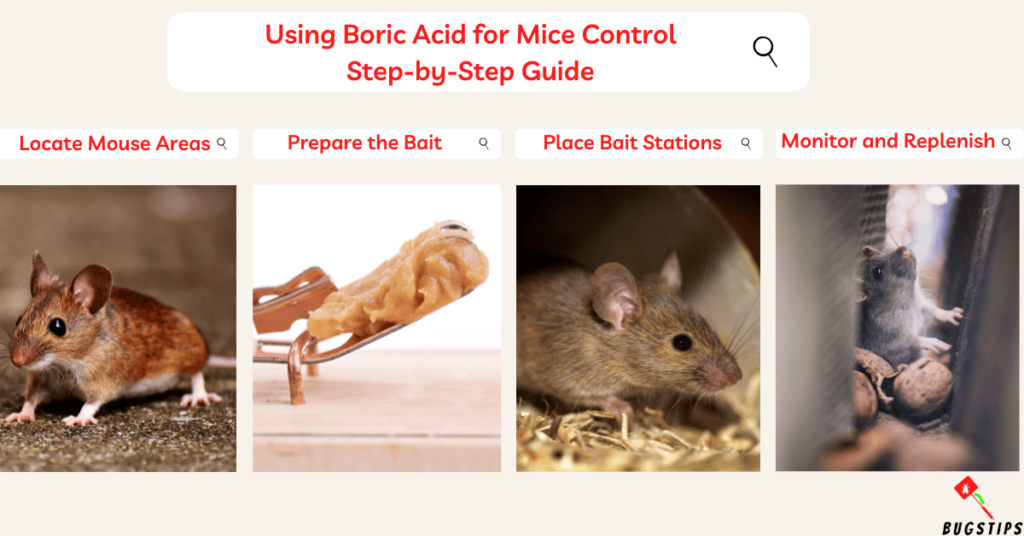
In this section, we’ll provide a step-by-step guide on using boric acid for mice control, including how to prepare the mixture, and where to place it, By following these steps, you can use boric acid to help control mice infestations in your home.
- Step 1: Locate Mouse Activity Areas
- Start by identifying the areas in your home where mice are frequently seen or where signs of their presence, such as droppings or chewed materials, are evident.
- Common areas include kitchens, pantries, basements, and storage spaces.
- Start by identifying the areas in your home where mice are frequently seen or where signs of their presence, such as droppings or chewed materials, are evident.
- Step 2: Prepare the Bait
- Wear gloves and mix the boric acid powder with a food attractant that is appealing to mice, such as peanut butter or chocolate powder.
- The ratio should be approximately 1 part boric acid to 10 parts bait. Mix thoroughly to ensure even distribution.
- Wear gloves and mix the boric acid powder with a food attractant that is appealing to mice, such as peanut butter or chocolate powder.
- Step 3: Place Bait Stations
- Using small disposable containers or bait stations, place small amounts of the boric acid bait mixture in strategic locations near mouse activity areas.
- Ensure that the bait is inaccessible to children and pets by placing it in areas where they cannot reach.
- Using small disposable containers or bait stations, place small amounts of the boric acid bait mixture in strategic locations near mouse activity areas.
- Step 4: Monitor and Replenish
- Regularly check the bait stations to monitor mouse activity. If the bait is consumed or shows signs of disturbance, replenish it with fresh bait.
- Remember to wear gloves while handling the bait and follow safety precautions.
- Regularly check the bait stations to monitor mouse activity. If the bait is consumed or shows signs of disturbance, replenish it with fresh bait.
Tips for Best Results
- Patience is Key
- Remember that boric acid is not a quick solution. It may take several days or weeks to see noticeable results. Stay consistent and patient in your approach.
- Proper Placement
- Position the bait stations in areas where mice are likely to encounter them, such as along walls or near entry points. Mice tend to travel along edges, so placing the bait strategically increases the chances of their exposure to the boric acid.
- Consider Multiple Methods
- Combining boric acid with other mouse control methods, such as traps or ultrasonic devices, can enhance the effectiveness of your overall strategy.
While boric acid can help control mice infestations, it may not completely get rid of them. If the problem continues or becomes too difficult to manage, it's a good idea to get help from a professional pest control service.
Precautions and Safety Measures When Using Boric Acid
When using boric acid to control mice, it’s important to prioritize safety in your home. To avoid any potential harm, here are some precautions and safety measures to keep in mind while handling boric acid:
- Read and Follow the Label Instructions
- Before using any boric acid product, carefully read the label instructions and follow them precisely. Pay attention to the recommended dosage, application methods, and any specific safety precautions provided by the manufacturer.
- Wear Protective Gear
- When handling boric acid, always wear protective gear, including gloves, goggles, and a mask. This helps prevent direct contact with the skin, eyes, and respiratory system, minimizing the risk of irritation or inhalation.
- Keep Away from Children and Pets
- Store boric acid products securely in a place that is inaccessible to children and pets. Remember, even small amounts of boric acid can be harmful if ingested or inhaled by animals or young children.
- Avoid Food Contamination
- Do not use boric acid in areas where food is prepared, stored, or consumed. Take precautions to prevent accidental contamination of food or food surfaces with boric acid.
- Proper Disposal
- Dispose of unused boric acid or empty containers according to local regulations. Do not discard them in regular household trash or pour them down drains or sewers.
- Ventilation
- Ensure proper ventilation when applying boric acid in enclosed spaces. Open windows or use fans to improve air circulation and reduce the concentration of airborne particles.
- Avoid Skin Contact
- Minimize direct skin contact with boric acid by wearing gloves. If accidental contact occurs, wash the affected area thoroughly with soap and water.
- Health Concerns
- While boric acid is generally considered low in toxicity to humans, prolonged or excessive exposure can lead to health issues. Some individuals may experience skin irritation, eye irritation, respiratory problems, or allergic reactions. If any adverse symptoms occur, seek medical attention promptly.
If you have concerns about using boric acid or if the mouse infestation persists, consult a professional pest control service for further guidance and assistance.
By following these precautions and safety measures, you can minimize potential risks and ensure the responsible use of boric acid for mice control in your home.
You May Also Like – 10 Long Skinny Black Bugs in House | Effective Guide
Are There Any Alternatives to Boric Acid for Mice Control?
There are several alternatives to boric acid that can be effective for mice control. While boric acid is commonly used for pest control, including ants and cockroaches, its effectiveness against mice can be limited.
If you’re looking for alternative methods, here are a few options to consider:
Snap Traps
Snap traps are widely used for mice control and are highly effective when placed in strategic locations. These traps consist of a spring-loaded mechanism that snaps shut when a mouse triggers it. Snap traps can be baited with food to attract mice and provide a quick and humane method of capture.
Glue Traps
Glue traps are another option for capturing mice. These traps consist of a sticky adhesive surface that traps mice when they come into contact with it.
However, it’s important to note that glue traps may not be considered as humane as snap traps, as mice can become stuck and may need to be euthanized.
Electronic Traps
Electronic traps use batteries or electrical power to deliver a lethal shock to mice when they enter the trap. These traps are designed to be safe for use around children and pets, and they provide a quick and efficient method of mice control.
Ultrasonic Devices
Ultrasonic devices emit high-frequency sound waves that are inaudible to humans but can be irritating to mice. These devices are designed to deter mice and make the environment inhospitable for them.
Professional Pest Control Services
If you’re facing a persistent or severe mouse infestation, it may be beneficial to seek the assistance of professional pest control services. Pest control professionals have the knowledge, experience, and tools to assess the situation, develop a customized plan, and effectively eliminate mice from your home.
Final Thoughts
Boric acid may not be the most effective solution for mice control, but it can be a part of your overall strategy. Remember to prioritize safety, consider alternative methods, and stay adaptive in your approach. With persistence and dedication, you can create a mice-free environment in your home.
FAQs
What happens if mice eat borax?
Borax is not effective in killing mice. It is unlikely to cause significant harm to mice if ingested in small amounts.
How do you use borax powder on rats?
Borax is a non-toxic, safe, and effective way to get rid of rats. It can be used as a suffocating agent that stops the rat’s respiratory system from working.
Can I mix boric acid with water and spray it?
Yes, boric acid can be mixed with water to make a spray solution. However, it is important to follow the safety instructions provided with the product and avoid spraying the solution on food surfaces.
Will boric acid and peanut butter kill mice?
Boric acid is not effective for mice control, and peanut butter is a popular bait for mouse traps.
Is borax safe for the house?
Borax is not completely safe and can cause respiratory issues, digestive problems, and skin irritations if ingested or inhaled.
How long does it take for boric acid to eliminate a mouse infestation?
Boric acid is not a reliable method for eliminating a mouse infestation. It may have a limited impact on mice populations, and the time it takes to see results can vary from days to weeks.
Why did people stop using borax?
People have stopped using borax for mice control due to its limited effectiveness. Alternative methods offer more reliable and efficient ways to deal with mice infestations.
Resources – (for further reading)
Oregon State University – Boric Acid General Fact Sheet
ScienceDirect – Developmental toxicity of boric acid in mice and rats
National Institutes of Health – The Developmental Toxicity of Boric Acid in

